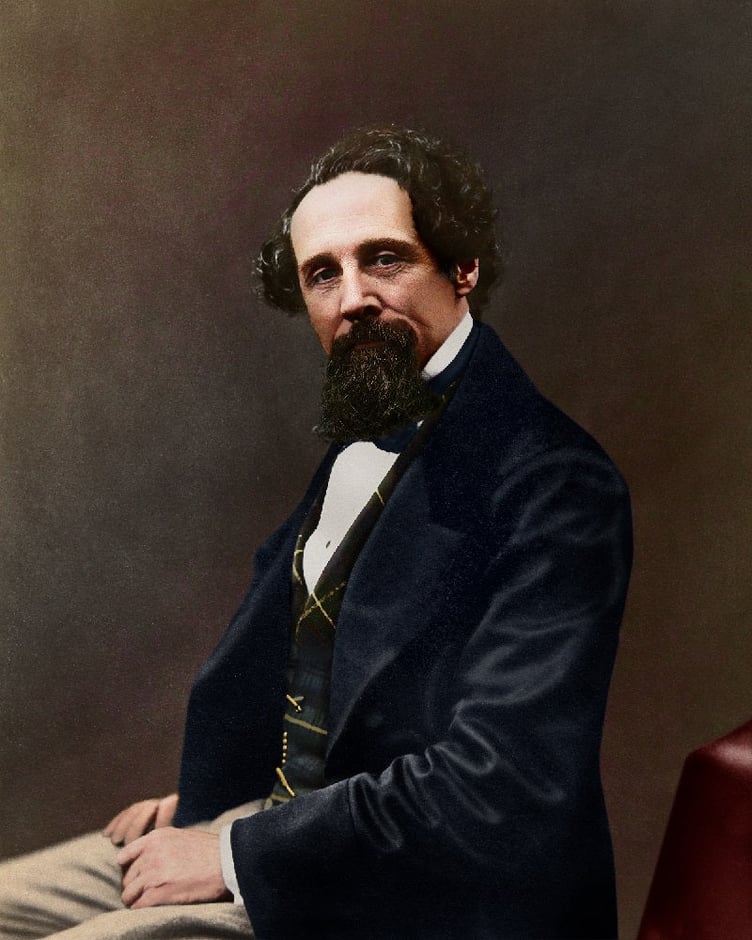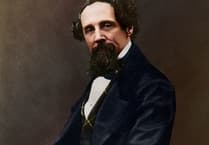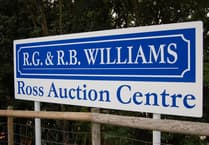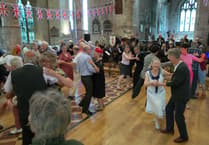TURKEY is as much a part of Christmas as tinsel and holly… and famous Wye Valley visitor Charles Dickens loved the festive fowl more than most, as immortalised in A Christmas Carol.
The writer had ‘Great Expectations’ of tucking into a sumptuous feast on December 25 1869, courtesy of his Ross-on-Wye-based tour manager.
But it was more ‘Bleak House’ at the Dickens home, as the ‘magnificent bird’ never arrived to grace his table – on what proved to be his last Christmas – having been burnt to a cinder enroute in a railway fire.
George Dolby had sent a 30lb whopper to the writer’s Rochester home from Ross station.
But when it failed to appear by December 24, an exasperated Dickens telegraphed: “Where is that turkey? It has not arrived!!!!!!!”
Christmas without turkey was a complete ‘no-no’ for the writer, who famously had Ebenezer Scrooge present one to the Cratchits in his festive story of redemption and celebration.
A regular visitor to Ross in the 1860s, where Dolby and the writer’s literary agent John Forster both lived, Dickens had been promised the bird by the former by Christmas Eve.
But its failure to wing in on time caused Christmas consternation according to Dolby, who lived at the town’s Ashfield Lodge and then Wilton House, and wrote about the event in his 1887 memoir ‘Charles Dickens As I Knew Him’.
Dolby, who oversaw Dickens’ reading tours in the UK and America, penned that he had obtained a ‘magnificent bird’, and added: “I caused immense pains to be taken for the production of the finest turkey the neighbourhood of Ross, or even the whole county of Hereford, could afford.”
But he feared it may be ‘Yule gruel’ when he heard that 12 other food parcels had failed to reach their destination, and raced off for the station, meeting a flustered-looking station-master James Rycroft rushing towards him.
And there was disbelief when Dolby heard the shocking news that the horse box rail carriage carrying the turkey and hampers had gone up in smoke between Gloucester and Reading.
It was thought that engine sparks may have set the carriage’s wooden frame on fire in a tunnel, although the exact cause was never found.
Dolby thought his goose was cooked, writing that the “value was as nothing compared with my distress of mind at the thought of Mr Dickens going without his turkey on Christmas Day”.
He sent the author of Great Expectations an immediate telegram explaining the disaster and desperately telling him to try and find a replacement bird.
Dickens’ immediate reaction or success in finding another turkey isn’t known.
But a recently rediscovered letter written by him in response to an apology from rail bosses, now at the National Railway Museum in York, says: “I have no doubt my Christmas fare was destroyed by an unavoidable accident, and that I bore the loss with unbroken good humour towards the Great Western Railway Company.”
Railway bosses might have done better to heed the experience of Jacob Marley though, as they profited by selling off the burnt remains of turkeys and beef to Reading’s poor for sixpence a portion, instead of giving them away.
Sadly Dickens died just six months later.
And as National Museum lead curator Ed Bartholomew noted after the letter was discovered in archives: “The bleak irony of this discovery is that the man who did so much to shape our Christmas experiences may himself have been left with an empty stomach on his last ever Christmas Day. Hard Times indeed!”





Comments
This article has no comments yet. Be the first to leave a comment.